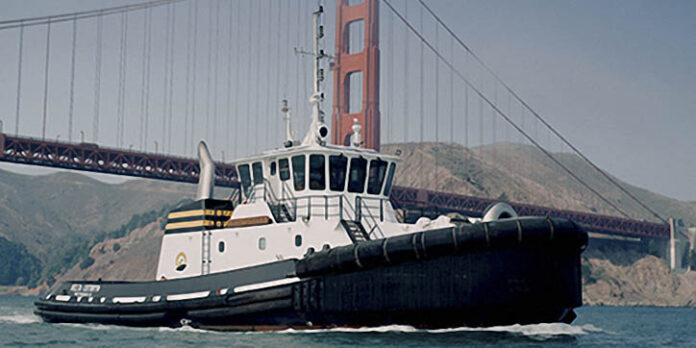
Rolls-Royce announced that they have received Approval in Principle (AIP) from classification organization ABS for its novel hybrid propulsion system for tractor tugs.
The AIP was granted following an evaluation of the world’s first hybrid tug, a unique vessel designed by Jensen Maritime and which Nichols Brothers Boat Builders will deliver to Baydelta Maritime LLC in February 2019. The vessel will be the first tug boat installed with the Rolls-Royce hybrid propulsion system.
ABS considers the Rolls-Royce hybrid system is, in principle, compliant with ABS Rules for Building and Classing Steel Vessels Under 90m (2018); ABS Advisory on Hybrid Electric Power Systems (2017); and ABS Guidance Notes on Review and Approval of Novel Concepts.
Griff Lane, Rolls-Royce SVP Commercial Marine, Americas, said: “Our long-standing partnership with Baydelta Maritime and close cooperation with Jensen Maritime, Nichols Brothers and ABS has paved the way for an innovative, environmentally-friendly hybrid tug capable of safe and reliable operation and maximum bollard pull. The Rolls-Royce hybrid system enhances the tug’s escort capability, providing unsurpassed assist support to the ultra-large containerships that operate from US West Coast ports.”
The Rolls-Royce Hybrid Propulsion System consists of Power Take-In (PTI), electric motors, and main propulsion engines connected to Rolls-Royce azimuth thrusters, allowing vessel to operate in either a diesel-mechanical, diesel-electric or boost mode configuration.
“The key benefit of a hybrid configuration is that it reduces the power requirement,” said Lane. “Typically, a tug the size of the Baydelta vessel would need a power output 2500kW. The hybrid arrangement allows operators to achieve the required bollard pull from a smaller engine. It provides greater operational flexibility which allows for the system to provide improved fuel efficiency, redundancy, and reduced emissions.”
“ABS is an industry leader in providing guidance to support safe development and deployment of hybrid power across the maritime sector.” said Derek Novak, ABS Senior Vice President Technology and Engineering. “We are pleased to work with innovative companies like Rolls-Royce, Baydelta Maritime, Jensen Maritime, and Nichols Brothers aiding the development of environmentally friendly technologies,”
Atle David Monsen, Rolls-Royce VP Sales, Integrated Ship Systems added: “Deep system integration between engines, electrical equipment, thrusters and automation systems is crucial in hybrid vessels. The Approval in Principle from ABS helps confirm the safety and functionality of the Rolls-Royce hybrid tug concept. With Rolls-Royce as a system integrator the risk and complexity for both owner and yard is significantly reduced.”
Rolls-Royce will supply all electric motors, shaft generators and a power management and control system. The hybrid arrangement provides power to US255 azimuth thrusters with ducted fixed pitch propellers that can be rotated 360 degrees around the vertical axis. This arrangement optimises omni-directional thrust and manoeuvrability as well as providing improved crash stop capability.



